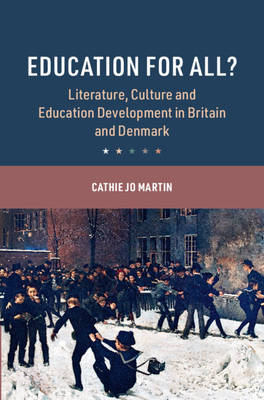
- Afhalen na 1 uur in een winkel met voorraad
- Gratis thuislevering in België vanaf € 30
- Ruim aanbod met 7 miljoen producten
- Afhalen na 1 uur in een winkel met voorraad
- Gratis thuislevering in België vanaf € 30
- Ruim aanbod met 7 miljoen producten
Zoeken
Education for All?
Literature, Culture and Education Development in Britain and Denmark
Cathie Jo Martin
€ 158,95
+ 317 punten
Omschrijving
Why did Denmark develop mass education for all in 1814, while Britain created a public-school system only in 1870 that primarily educated academic achievers? Cathie Jo Martin argues that fiction writers and their literary narratives inspired education campaigns throughout the nineteenth-century. Danish writers imagined mass schools as the foundation for a great society and economic growth. Their depictions fortified the mandate to educate all people and showed neglecting low-skill youth would waste societal resources and threaten the social fabric. Conversely, British authors pictured mass education as harming social stability, lower-class work, and national culture. Their stories of youths who overcame structural injustices with individual determination made it easier to blame students who failed to seize educational opportunities. Novel and compelling, Education for All? uses a multidisciplinary perspective to offer a unique gaze into historical policymaking. This title is part of the Flip it Open Programme and may also be available Open Access. Check our website Cambridge Core for details.
Specificaties
Betrokkenen
- Auteur(s):
- Uitgeverij:
Inhoud
- Aantal bladzijden:
- 286
- Taal:
- Engels
- Reeks:
Eigenschappen
- Productcode (EAN):
- 9781009419659
- Verschijningsdatum:
- 21/09/2023
- Uitvoering:
- Hardcover
- Formaat:
- Genaaid
- Afmetingen:
- 152 mm x 229 mm
- Gewicht:
- 594 g

Alleen bij Standaard Boekhandel
+ 317 punten op je klantenkaart van Standaard Boekhandel
Beoordelingen
We publiceren alleen reviews die voldoen aan de voorwaarden voor reviews. Bekijk onze voorwaarden voor reviews.











